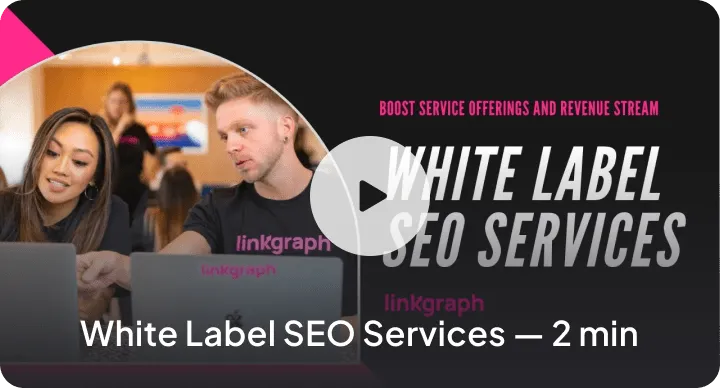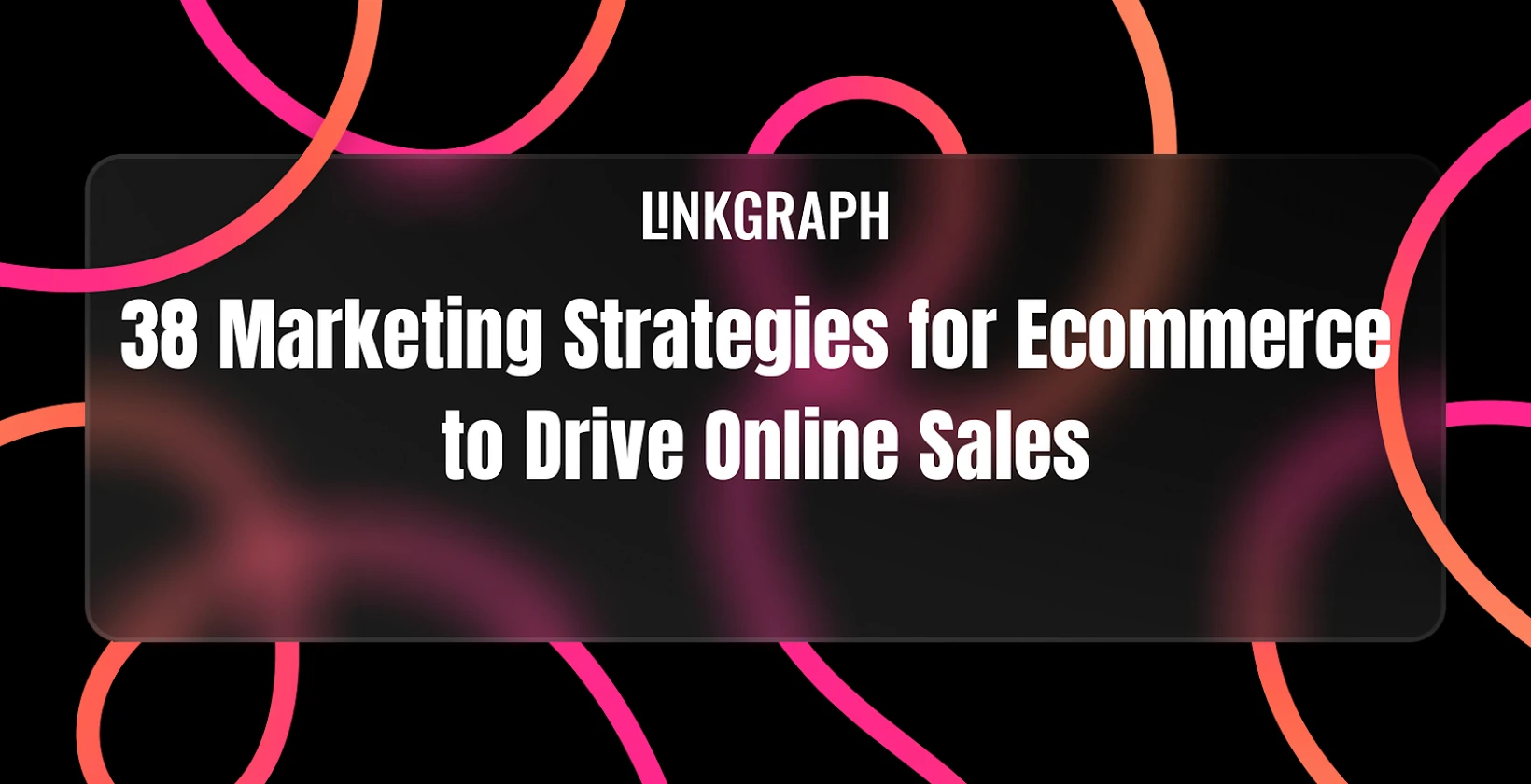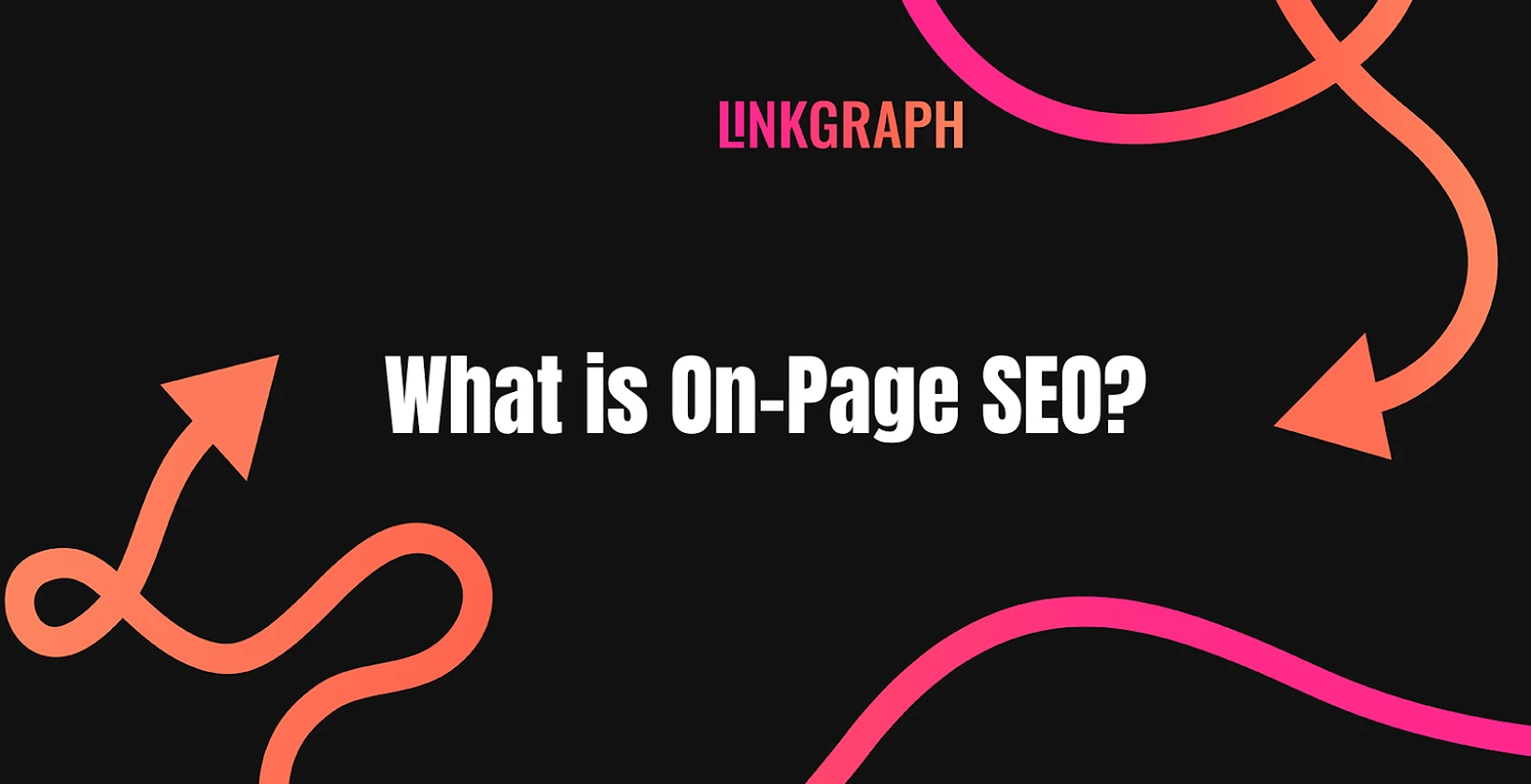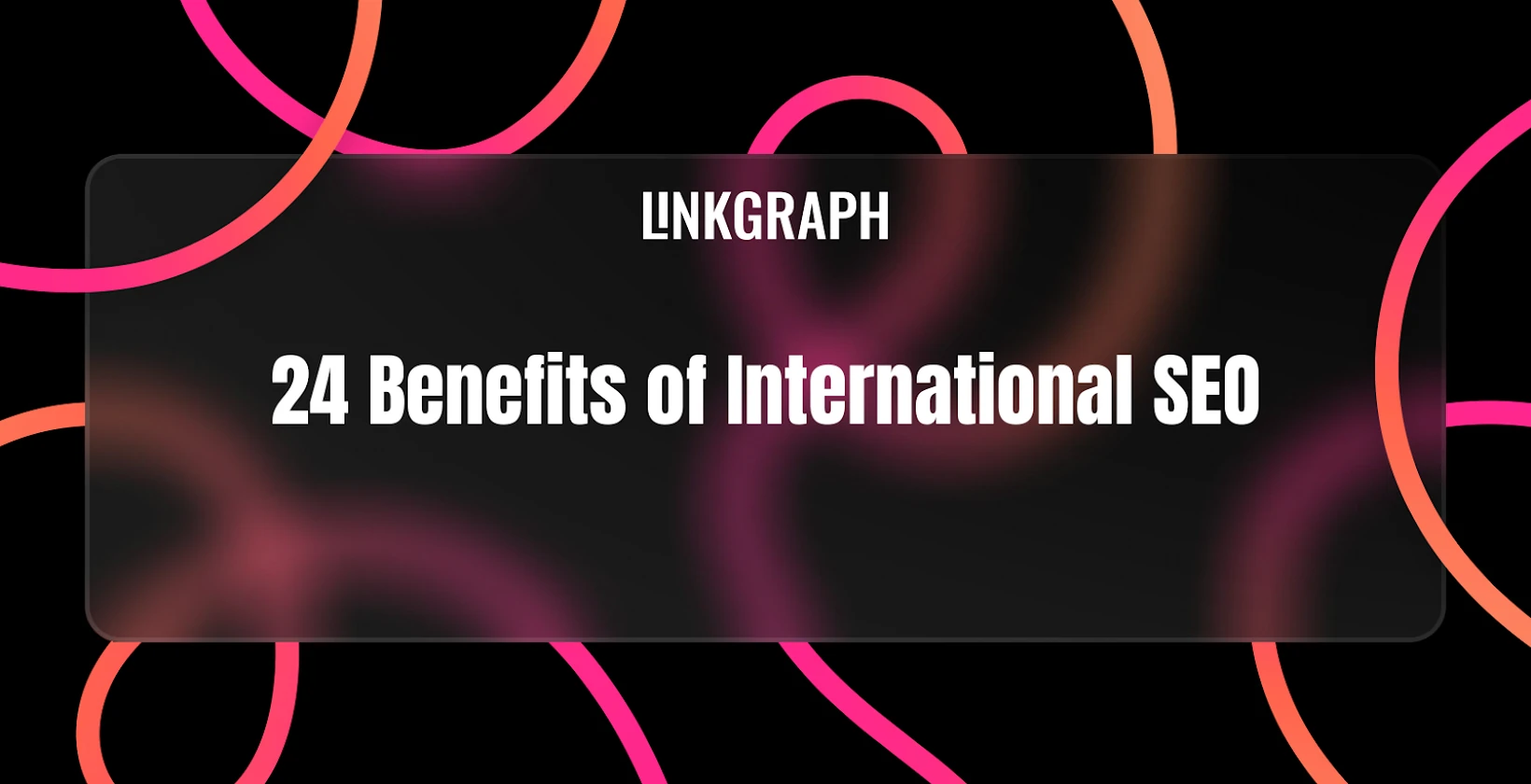What Is Off-Page SEO?
Off-page SEO is a type of SEO that focuses on actions taken off of a website to improve rankings in search engine results. The meaning of off-page […]
Off-page SEO is a type of SEO that focuses on actions taken off of a website to improve rankings in search engine results. The meaning of off-page SEO lies in building trust, authority, and relevance through external signals. Its definition includes techniques that optimize site visibility by earning recognition from other domains, platforms, and communities. The purpose of off-page SEO is to strengthen site credibility through backlinks, mentions, and digital relationships that happen outside of a website.
Common off-page SEO techniques include link building, brand mentions, press releases, guest posting, digital PR, local SEO, citations, reviews, influencer marketing, content sharing, social media, forums, Q&A platforms, podcasting, webinars, and online events. These methods help search engines evaluate site trustworthiness based on how others interact with and reference the brand. Strong off-page signals improve domain authority, drive referral traffic, and increase chances of ranking for competitive keywords.
This article covers every important off-page SEO technique, the meaning and purpose behind each one, and how to apply them. It explains what to prioritize, how to combine methods, and what to avoid, offering a complete view of how to optimize search visibility off of a website.
What is the Importance of Off-Page SEO?
Off-page SEO improves search engine rankings by building trust, authority, and relevance outside the website. Off-page SEO sends external signals that search engines use to measure site credibility. Off-page SEO supports ranking improvement by increasing quality references to the site across the web.
Off-page SEO boosts visibility, which leads to more traffic. Search engines prioritize websites that other sites mention and link to. These mentions act as endorsements that increase domain authority.
Unlike on-page SEO, which focuses on internal elements like content and HTML tags, off-page SEO strengthens site position using external actions. On-page SEO improves technical quality and content relevance, but off-page SEO builds a reputation that supports these efforts.
Link building is the first and most impactful off-page SEO technique. Link building earns backlinks from authoritative sites, signaling trust to search engines. Brand mentions increase recognition and tell search engines that the business has influence in its field. Press releases distribute news across media sites, earning exposure and referral links that improve search performance.
Off-page SEO drives long-term growth by reinforcing what on-page SEO establishes. Search engines reward websites that have both technical optimization and strong external validation.
What are the Off-Page SEO Techniques?
Off-page SEO techniques refer to all activities performed outside the website to improve search engine rankings. Off-page SEO builds authority, increases trust, and strengthens the online reputation of a domain. These techniques focus on earning links, mentions, and signals that influence how search engines rank a website.
There are many Off-page SEO techniques. The many Off-page SEO techniques have been listed below.
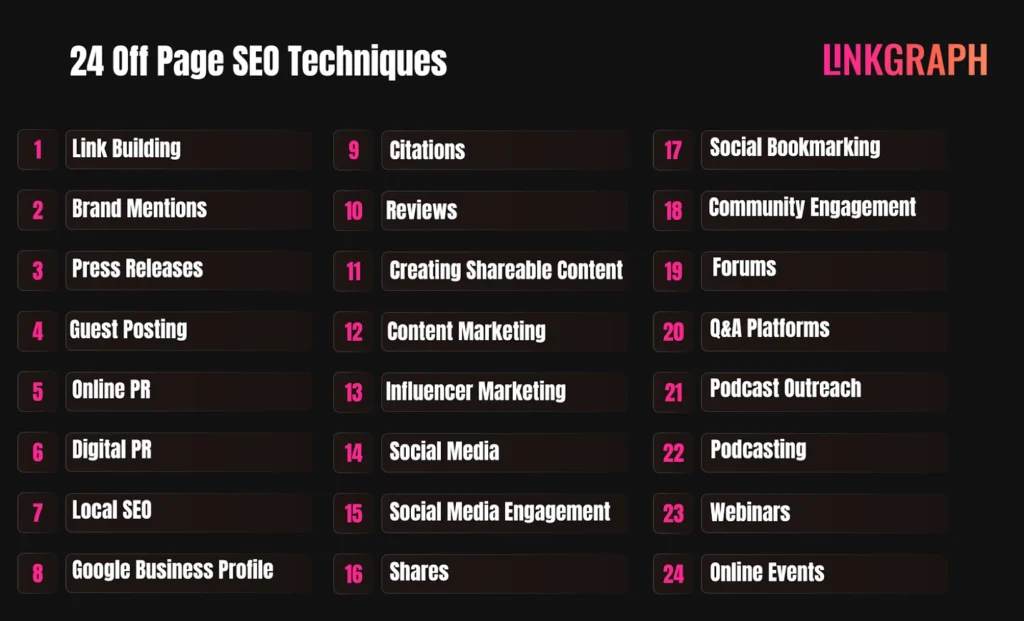
Each technique adds to website credibility by signaling relevance, expertise, and trust to search engines. Off-page SEO works in combination with on-page SEO to strengthen rankings and increase targeted traffic. This article breaks down Off-page SEO techniques in detail below.
1. Link Building
Link building is a foundational off-page SEO technique that focuses on earning hyperlinks from external websites. Link building signals authority, trust, and relevance to search engines. Link building helps a domain rise in rankings by acting as a vote of confidence from other sources.
Link building improves off-page SEO by strengthening the website backlink profile. Each link from a credible source increases domain authority and supports visibility across Google search results. Pages with more high-quality backlinks tend to rank higher, especially in competitive spaces.
The process of link building starts with identifying target pages and relevant sources. Strong link building uses outreach, guest posts, press coverage, and resource links from niche websites. Link building also benefits from creating content that others naturally want to reference.
Link building refers to the deliberate act of earning backlinks to specific URLs. Link building influences how search engines understand the popularity and relevance of a page.
Link building plays a critical role in off-page SEO by optimizing authority signals. A strong link profile improves rankings, drives referral traffic, and supports long-term visibility across search engines.
2. Brand Mentions
Brand mentions are an off-page SEO technique used to build authority and reinforce trust signals across the web. Brand mentions occur when third-party sites refer to a brand name without linking directly to the website. Brand mentions tell search engines that a business has recognition and relevance within its industry.
Brand mentions improve off-page SEO by generating unlinked references that strengthen entity associations. Google identifies brand mentions through natural language processing and uses them to assess reputation and influence. Pages linked to recognized brands tend to rank higher, especially in competitive search results.
Brand mentions start with increasing public visibility. Businesses earn mentions by sharing press releases, publishing guest posts, gaining features in roundups, or joining conversations on industry blogs. Strong brand positioning leads to more mentions across authoritative sources.
Brand mentions refer to any appearance of a business name on third-party websites, even without a clickable link. Brand mentions help search engines connect the brand with topics, industries, and queries users frequently search.
Brand mentions contribute to off-page SEO by building topical authority and establishing credibility. This technique supports brand-based searches, improves trust signals, and enhances overall online presence in Google ranking systems.
3. Press Releases
Press releases are a brand and authority-building off-page SEO technique that helps distribute official news to media outlets and online publishers. Press releases share announcements, product launches, partnerships, or events with the public through structured content sent to trusted platforms. Press releases allow businesses to gain visibility across high-authority domains.
Press releases improve off-page SEO by earning mentions and backlinks from media sites, news aggregators, and industry blogs. Search engines recognize these signals as indicators of trust, relevance, and topical authority. Pages associated with widely covered press releases often gain higher positions in search results.
To execute press releases, businesses write concise, newsworthy content and distribute it through press release distribution services or direct media outreach. Journalists, bloggers, and publishers then pick up and syndicate the release, expanding reach and credibility.
A press release refers to a formal written communication that shares company news with the public through media channels. A press release connects the brand with authoritative sources and supports recognition beyond the website.
Press releases enhance off-page SEO by optimizing brand visibility, strengthening authority signals, and earning valuable mentions across trusted domains. This method supports both branded search growth and trustworthiness in Google ranking systems.
4. Guest Posting
Guest posting is a direct link acquisition technique that places original content on external websites to earn backlinks and visibility. Guest posting involves writing valuable articles for other platforms in the same industry or niche. Guest posting helps connect the brand with new audiences while earning links from relevant, authoritative sources.
Guest posting improves off-page SEO by securing contextual backlinks from reputable domains. These backlinks act as ranking signals that increase domain authority, support keyword performance, and improve search engine trust. Pages linked through guest content often perform better across competitive queries.
Guest posting begins by identifying high-quality websites that accept guest contributions. Outreach teams then pitch topics aligned with the target audience and submit unique content that includes natural links back to the business website. Publishers approve the content and share it with their readership.
Guest posting refers to the practice of contributing written content to third-party sites for brand exposure and link building. Guest posting offers value to both parties, publishers receive relevant content, and contributors gain backlinks and visibility.
Guest posting strengthens off-page SEO by building trusted link relationships and expanding the domain authority footprint. This technique directly supports link profile growth and improves visibility in organic search rankings.
5. Online PR
Online PR is a brand and authority-building technique that focuses on gaining media coverage, digital features, and public attention across online platforms. Online PR involves strategic outreach to journalists, bloggers, and digital publications to promote stories or insights related to the brand. Online PR increases visibility while reinforcing business credibility.
Online PR improves off-page SEO by earning high-quality mentions and backlinks from authoritative media domains. These mentions act as trust signals that search engines use to assess brand authority and relevance. Strong online PR coverage helps content rank better and appear in knowledge panels or news results.
To implement online PR, teams identify newsworthy topics, prepare outreach campaigns, and pitch stories to digital media contacts. Online PR also uses platforms that connect brands with reporters looking for expert input. These efforts generate consistent media attention and strengthen brand recognition.
Online PR refers to managing brand reputation and visibility through digital news platforms, blogs, and online publications. Online PR builds influence through earned media exposure rather than paid advertisements.
Online PR supports off-page SEO by optimizing trust, authority, and public visibility across external sources. This technique helps search engines associate the brand with credibility, relevance, and industry leadership.
6. Digital PR
Digital PR is a brand and authority-building technique that combines traditional public relations with SEO and content marketing to earn online exposure. Digital PR uses data-driven storytelling, expert commentary, and creative assets to secure coverage on high-authority websites. Digital PR positions the brand as a credible source across trusted digital publications.
Digital PR strengthens off-page SEO by earning backlinks, citations, and branded mentions from top-tier media outlets. These signals improve domain authority and help search engines understand brand expertise, relevance, and trustworthiness. Digital PR also increases referral traffic and visibility in search results.
To apply digital PR, teams develop newsworthy stories, surveys, reports, or visual content. These assets are pitched to journalists, bloggers, and content creators across relevant industries. Digital PR campaigns also use media databases and real-time journalist request platforms to gain traction.
Digital PR refers to the strategic promotion of a brand through online media coverage, aimed at improving both reputation and SEO. Digital PR delivers long-term value by building a digital footprint that supports keyword rankings and brand visibility.
Digital PR contributes to off-page SEO by optimizing authority signals and strengthening public credibility. This technique improves how search engines and users perceive the brand across the broader web.
7. Local SEO
Local SEO is an overarching off-page SEO technique that focuses on improving visibility in location-based search results. Local SEO helps businesses appear in searches that include local intent, such as “near me” queries or geographic terms. Local SEO builds trust signals that connect the business to a specific location and service area.
Local SEO enhances off-page SEO by creating strong local signals through directories, reviews, and map listings. Search engines use these signals to determine which businesses are most relevant for local queries. Accurate and consistent local listings support better rankings in both Google Maps and organic results.
Local SEO begins with creating and optimizing a Google Business Profile, submitting to reputable directories, and earning local backlinks. Businesses also encourage satisfied customers to leave reviews, which strengthen trust and relevance. Local content and community involvement add additional weight to local signals.
Local SEO refers to the process of improving business online presence to attract traffic from local searches. Local SEO focuses on location accuracy, business relevance, and proximity in search algorithms.
Local SEO supports off-page SEO by optimizing geographic authority, customer trust, and business visibility in targeted regions. This technique increases traffic from nearby users and builds credibility in the local search ecosystem.
8. Google Business Profile
Google Business Profile is a local SEO signal that helps businesses appear in Google Search and Google Maps for location-based queries. Google Business Profile gives search engines verified information about the business, including name, address, phone number, hours, and service areas. Google Business Profile connects the business directly to local visibility opportunities.
Google Business Profile improves off-page SEO by creating a trusted source of structured business data. Google pulls information from the profile to display rich results like the Local Pack and Knowledge Panel. A complete and optimized profile improves ranking for local searches and increases click-through rates.
The process begins by claiming the profile through Google and completing all business details with accuracy. Businesses upload photos, post updates, respond to reviews, and select relevant categories to enhance the listing. Ongoing updates and engagement strengthen its performance.
Google Business Profile refers to a free business listing tool provided by Google that supports visibility in local search results. Google Business Profile offers a direct way for businesses to control how their information appears to nearby customers.
Google Business Profile contributes to off-page SEO by sending strong local relevance signals and increasing trust through verified data. This technique supports location-based rankings and drives traffic from searchers looking for nearby products or services.
9. Citations
Citations are a local SEO signal that involve listing business name, address, and phone number (NAP) on external directories. Citations appear on platforms like local business listings, review sites, and industry-specific directories. Citations give search engines consistent location data that supports business presence in local search results.
Citations improve off-page SEO by validating business identity and reinforcing geographic relevance. Accurate citations increase trust signals and help Google associate the brand with a specific location. The more consistent and widespread the citations, the stronger local authority.
Citations are created by submitting NAP details to trusted directories, government sites, local chambers, and niche platforms. Every listing must match information on the Google Business Profile and the website. Inconsistent citations weaken trust and hurt local visibility.
Citations refer to online references of business core contact details across third-party platforms. Citations serve as confirmation points that help search engines verify legitimacy and location of the business.
Citations support off-page SEO by optimizing location accuracy, authority, and presence in local search ecosystems. This technique helps businesses rank higher in Google Local Pack and map results while increasing visibility to nearby customers.
10. Reviews
Reviews are a hybrid off-page SEO technique that serve as both local SEO signals and brand authority builders. Reviews appear on platforms like Google, Yelp, Facebook, and industry-specific directories. Reviews help search engines and users evaluate business reputation, trustworthiness, and customer satisfaction.
Reviews improve off-page SEO by generating user-generated content that strengthens credibility and local relevance. Positive reviews increase click-through rates and influence local pack rankings. A strong review profile builds trust, which helps search engines view the business as a reliable choice for local queries.
To earn reviews, businesses request feedback from satisfied customers after purchases or service interactions. Businesses respond to both positive and negative reviews to show engagement and professionalism. Review generation tools and email follow-ups support a steady stream of authentic feedback.
Reviews refer to public ratings and written feedback left by customers on third-party platforms. Reviews provide social proof that influences buyer behavior and search engine perception.
Reviews impact off-page SEO by optimizing trust signals, improving local rankings, and reinforcing brand reputation. This technique increases visibility across map results, local packs, and branded search outcomes.
11. Creating Shareable Content
Creating shareable content is a content promotion technique that drives engagement, builds backlinks, and expands brand reach across platforms. Creating shareable content involves producing valuable, original, and visually engaging materials that people distribute across websites, blogs, and social channels. Creating shareable content encourages organic promotion from readers, publishers, and influencers.
Creating shareable content improves off-page SEO by increasing the likelihood of earning backlinks and social mentions. Shareable content spreads quickly across the web, generating authority signals that search engines associate with trust and relevance. Highly shared content often attracts attention from high-authority domains.
To create shareable content, content creators focus on formats that naturally gain traction, such as infographics, expert roundups, data-driven insights, videos, or how-to guides. Strategic content also addresses trending topics or solves specific problems to increase value and engagement.
Creating shareable content refers to the development of materials designed for easy distribution and high engagement. Creating shareable content allows a brand to reach new audiences without relying solely on direct outreach.
Creating shareable content supports off-page SEO by earning natural backlinks, improving visibility, and strengthening digital authority. This technique amplifies brand online presence and enhances ranking potential through widespread distribution.
12. Content Marketing
Content marketing is a content promotion and brand authority-building technique that creates and distributes valuable content to attract and retain a target audience. Content marketing focuses on delivering relevant information that builds trust, earns attention, and drives long-term engagement. Content marketing supports both user experience and search visibility.
Content marketing improves off-page SEO by attracting backlinks, mentions, and shares from trusted external sources. High-quality content often earns citations from blogs, news sites, and influencers, all of which increase domain authority and ranking potential. Search engines reward websites that consistently produce expert-level content referenced by others.
To execute content marketing, businesses develop educational, informative, or entertaining materials in formats such as blogs, whitepapers, videos, and case studies. Distribution through email, social platforms, syndication, and media outreach helps expand content reach and influence.
Content marketing refers to the strategic creation and promotion of materials that deliver value to defined audiences. Content marketing strengthens brand recognition, builds topical relevance, and supports digital visibility across multiple channels.
Content marketing contributes to off-page SEO by generating authority signals, building trust, and expanding website influence. This technique helps attract organic links and positions the brand as a reliable resource in its niche.
13. Influencer Marketing
Influencer marketing is a brand and authority-building technique that leverages the reach and credibility of individuals with established online audiences. Influencer marketing allows businesses to promote products or content through trusted voices across platforms like YouTube, Instagram, LinkedIn, and niche blogs. Influencer marketing builds social proof and increases brand visibility.
Influencer marketing improves off-page SEO by earning branded mentions, high-quality backlinks, and content amplification from respected sources. Influencers create exposure that leads to citations and inbound links from blogs, media sites, and user-generated content. These signals increase trust and relevance in the eyes of search engines.
To use influencer marketing, businesses identify influencers aligned with their niche and reach out with collaboration offers. Campaigns involve sponsored content, product reviews, interviews, or co-created resources. Partnerships that feel authentic tend to perform better and generate long-term SEO value.
Influencer marketing refers to forming partnerships with content creators to promote a brand, service, or message. Influencer marketing combines reach, trust, and creativity to position brands in front of targeted audiences.
Influencer marketing supports off-page SEO by building credibility, attracting referral traffic, and strengthening domain external reputation. This technique enhances brand authority while generating natural, earned media that supports long-term search visibility.
14. Social Media
Social media is a content promotion and brand authority-building technique that distributes content, increases brand exposure, and engages audiences across platforms. Social media connects businesses with users through posts, shares, comments, and interactions on channels like Facebook, LinkedIn, Instagram, X (formerly Twitter), and YouTube. Social media builds awareness and trust across the digital ecosystem.
Social media improves off-page SEO by driving engagement, earning indirect backlinks, and amplifying reach. Popular content on social platforms often gets shared, cited, or embedded by publishers, increasing mentions and visibility. High engagement signals reinforce relevance, which supports better rankings in branded and topical searches.
Social media marketing starts by creating a consistent posting schedule, sharing high-value content, and engaging with followers. Businesses join conversations, use trending hashtags, collaborate with creators, and promote posts to expand reach. Cross-platform promotion strengthens presence and boosts traffic to key landing pages.
Social media refers to digital platforms where users create and share content, interact with others, and build communities. Social media spreads messages quickly and helps brands stay relevant in ongoing public conversations.
Social media supports off-page SEO by increasing brand visibility, encouraging external mentions, and attracting visitors from multiple sources. This technique enhances reputation and helps search engines associate the brand with expertise and engagement.
15. Social Media Engagement
Social media engagement is a content promotion and brand authority-building technique that measures how audiences interact with brand content on social platforms. Social media engagement includes likes, comments, shares, saves, and direct messages that signal audience interest and involvement. Social media engagement reflects how well a brand resonates with its community.
Social media engagement improves off-page SEO by increasing the reach of content and encouraging shares that lead to backlinks and mentions. High engagement rates often lead to greater visibility, both within the platform and across search results. Search engines consider engagement signals when evaluating brand relevance and influence.
To increase social media engagement, businesses create content that sparks discussion, asks questions, responds to comments, and encourages user interaction. Consistent posting, real-time replies, and community-focused campaigns help grow a loyal, active audience. Collaborations and contests also boost engagement and reach.
Social media engagement refers to the level of public interaction with content shared on platforms like Instagram, LinkedIn, or Facebook. Social media engagement builds brand credibility and keeps the business top of mind across digital spaces.
Social media engagement supports off-page SEO by amplifying content distribution and reinforcing trust through audience validation. This technique helps search engines associate the brand with authority, relevance, and active participation in its niche.
16. Shares
Shares are a content promotion and brand authority-building technique that extends the reach of digital content across user networks and platforms. Shares occur when users repost or distribute content they find valuable, informative, or engaging. Shares help amplify brand visibility and attract attention from new audiences.
Shares improve off-page SEO by increasing the chances of earning backlinks, brand mentions, and citations. Content that receives many shares often gains traction with bloggers, journalists, and industry sites. These secondary mentions strengthen authority signals and support higher placement in search results.
To encourage sharing, businesses create content that is visually appealing, emotionally resonant, or highly informative. Content must be easy to share, with clear calls-to-action and social buttons placed strategically. Contests, infographics, quotes, and short videos often perform well.
Shares refer to user-driven actions that redistribute content across platforms like Facebook, LinkedIn, X (Twitter), and messaging apps. Shares validate content relevance and reflect its value in the eyes of the audience.
Shares support off-page SEO by expanding content exposure and triggering external engagement that leads to brand recognition. This technique increases reach, builds authority, and signals trust to both users and search engines.
17. Social Bookmarking
Social bookmarking is a direct link acquisition technique that involves submitting webpages to public platforms where users store, tag, and share content. Social bookmarking sites like Reddit, Mix, Scoop.it, and Flipboard allow users to organize links and make them discoverable to broader communities. Social bookmarking helps drive traffic and build external link signals.
Social bookmarking improves off-page SEO by earning backlinks from high-traffic platforms and increasing content exposure. Bookmarked content often gets indexed faster and attracts additional links from users who discover it through these channels. Search engines treat quality bookmarks as referral signals that contribute to domain authority.
To use social bookmarking effectively, businesses create accounts on relevant platforms and share URLs with descriptive tags and summaries. Submissions provide value, follow community guidelines, and match interests of each platform audience. Active participation and engagement improve visibility and reach.
Social bookmarking refers to the practice of saving and categorizing links to useful content on public websites. Social bookmarking boosts content discoverability and creates direct pathways for users and search engines to access the page.
Social bookmarking supports off-page SEO by increasing link volume, driving referral traffic, and enhancing brand visibility across niche online communities. This technique helps improve search performance through consistent external linking activity.
18. Community Engagement
Community engagement is a brand and authority-building technique that involves participating in online spaces where target audiences gather. Community engagement allows businesses to contribute insights, answer questions, and build relationships in forums, social groups, and niche communities. Community engagement increases visibility and builds trust within relevant networks.
Community engagement improves off-page SEO by generating brand mentions, referral traffic, and potential backlinks from active discussions. Search engines associate meaningful engagement with credibility, which helps improve ranking signals over time. Community-driven interactions also strengthen brand recall and authority in specific industries.
To engage effectively, businesses join platforms like Reddit, Quora, LinkedIn groups, and industry-specific forums. They participate by offering solutions, asking thoughtful questions, and sharing useful content without overt promotion. Long-term participation builds recognition and encourages natural linking from community members.
Community engagement refers to the active involvement in digital discussions where people seek knowledge, share opinions, and connect over shared interests. Community engagement helps position the brand as a helpful and reliable voice in its space.
Community engagement supports off-page SEO by increasing brand authority, encouraging third-party mentions, and driving interaction beyond owned platforms. This technique reinforces expertise and fosters relationships that enhance online reputation.
19. Forums
Forums are a brand and authority-building technique that help businesses participate in topic-specific discussions and reach targeted online communities. Forums allow users to ask questions, share experiences, and offer advice in structured threads. Forums build trust and provide platforms for showcasing expertise through genuine, helpful participation.
Forums improves off-page SEO by increasing brand mentions, generating referral traffic, and creating opportunities for backlinks. Active forum contributions strengthen authority signals by associating the brand with valuable insights in niche conversations. Search engines recognize these signals and reward credibility over time.
To use forums effectively, businesses identify communities relevant to their industry, such as Quora, Stack Exchange, or niche forums, and create profiles that reflect expertise. They contribute regularly to threads by offering clear answers, linking to useful content, and engaging in ongoing discussions without spamming.
Forums refer to digital discussion boards where users interact on specific topics or questions in organized formats. Forums allow businesses to position themselves as reliable contributors while expanding their reach among engaged audiences.
Forums support off-page SEO by boosting brand authority, generating organic mentions, and building connections in spaces aligned with user intent. This technique enhances trust and supports brand long-term visibility across search results.
20. Q&A Platforms
Q&A platforms are a brand and authority-building technique where businesses answer user questions on specialized websites. Platforms like Quora, Stack Exchange, and Reddit provide spaces for sharing knowledge and solving problems. Q&A platforms help establish expertise and increase brand visibility through thoughtful, helpful contributions.
Q&A platforms improve off-page SEO by generating branded mentions, referral traffic, and authoritative backlinks. High-quality answers often receive upvotes and visibility, leading to greater exposure and trust. Search engines recognize active participation on these platforms as a sign of domain expertise.
To apply this method, businesses identify relevant questions in their niche and provide clear, informative responses. Including links to valuable resources or the company website helps drive targeted traffic. Consistent, genuine engagement builds credibility and encourages users to return for advice.
Q&A platforms refer to online communities focused on user-generated questions and expert answers. These platforms connect brands with audiences seeking reliable information.
Q&A platforms support off-page SEO by enhancing brand authority, increasing mentions, and driving organic traffic from engaged users. This technique strengthens website reputation and relevance in niche markets.
21. Podcast Outreach
Podcast outreach is a brand and authority-building technique that focuses on securing guest spots on established podcasts. By participating in relevant industry shows, businesses share expertise with targeted audiences while gaining exposure through trusted hosts. Podcast outreach uses existing audiences to strengthen recognition and build credibility.
Podcast outreach improves off-page SEO by earning branded mentions, high-quality backlinks, and increased visibility across streaming platforms. Appearances often generate referral traffic from engaged listeners who are likely to explore the guest website. Search engines interpret these signals as endorsements, boosting domain authority and topical relevance.
To apply this method, businesses research podcasts in their niche, craft personalized pitches, and offer unique insights or case studies. After securing appearances, sharing episodes on social media and websites amplifies the reach. Repurposing podcast discussions into blogs or clips extends the value and attracts further citations.
Podcast outreach refers to collaborating with existing podcast creators to feature guest expertise. This approach builds influence through external platforms and connects brands with active listener communities.
Podcast outreach supports off-page SEO by strengthening brand authority, generating organic backlinks, and improving visibility across diverse digital ecosystems. This technique reinforces trust and expands audience reach.
22. Podcasting
Podcasting is a brand and authority-building technique that uses audio content to engage audiences and share expertise. Podcasting involves producing and distributing episodes on topics relevant to the brand industry or niche. Podcasting helps build trust and deepen relationships by delivering valuable insights in a conversational format.
Podcasting improves off-page SEO by generating backlinks and mentions when podcasts are featured on directories, blogs, and media sites. Podcasts also encourage social sharing and attract a loyal audience that often promotes episodes. Search engines value these signals as indicators of authority and audience engagement.
To start podcasting, businesses plan a series of episodes, select guests or hosts, and publish content on platforms like Spotify, Apple Podcasts, or Google Podcasts. Promoting episodes through social media, newsletters, and collaborations amplifies reach and visibility.
Podcasting refers to the creation and distribution of digital audio shows that inform or entertain listeners. Podcasting builds brand personality and positions the company as a thought leader within its market.
Podcasting supports off-page SEO by attracting external mentions, earning backlinks, and increasing brand authority. This technique enhances online reputation and drives targeted traffic from engaged listeners.
23. Webinars
Webinars are a brand and authority-building technique that deliver live or recorded presentations to educate and engage a targeted audience. Webinars allow businesses to share expertise, discuss industry trends, and answer questions in real time. Webinars strengthen brand trust by positioning the company as a knowledgeable and reliable voice.
Webinars improve off-page SEO by generating mentions, backlinks, and engagement from event listings, social shares, and post-webinar content. Webinars often lead to repurposed materials like blog posts, slides, or recordings, all of which attract external links. These signals contribute to domain authority and visibility.
To run webinars, businesses choose a relevant topic, invite guest speakers, and promote the event through websites, social channels, and email lists. After the event, teams share the recording, publish summaries, and encourage participants to link to or share the content.
Webinars refer to online seminars or workshops that educate viewers on specific subjects through live or on-demand formats. Webinars help businesses connect with their audience while showcasing expertise.
Webinars support off-page SEO by building brand authority, attracting backlinks, and increasing visibility through external promotion. This technique creates long-term value by expanding reach and reinforcing trust across digital channels.
24. Online Events
Online events are a brand and authority-building technique that bring people together in virtual spaces to share knowledge, network, or collaborate. Online events include conferences, product launches, workshops, and expert panels hosted on digital platforms. Online events give businesses a platform to lead conversations and showcase expertise in real time.
Online events improve off-page SEO by earning mentions, backlinks, and visibility through event promotion, media coverage, and user-generated content. Online events also generate post-event materials, like recaps, slides, and videos, that attract citations and extend reach. These activities strengthen brand reputation and online authority.
To run effective online events, businesses define the goal, select speakers, create promotional assets, and host the session through platforms like Zoom, Hopin, or YouTube Live. Promotion through social media, email campaigns, and partner networks increases participation and engagement.
Online events refer to structured virtual gatherings where brands share insights, demonstrate value, and build relationships with attendees. Online events create memorable experiences that foster brand loyalty and recognition.
Online events support off-page SEO by increasing brand exposure, encouraging third-party mentions, and building authority through active participation in industry discussions. This technique helps strengthen digital presence and reinforces trust across external platforms.
What is the Difference Between On-Page SEO and Off-Page SEO?
On-page SEO refers to optimization efforts made directly on the website, while off-page SEO involves external actions that impact site authority and visibility. On-page SEO includes elements like content quality, internal links, metadata, and page structure. Off-page SEO focuses on factors such as backlinks, brand mentions, reviews, and social signals.
The key difference lies in control. On-page SEO remains fully within the website owner control and directly shapes how search engines crawl, understand, and rank each page. Off-page SEO relies on external validation, where search engines assess trust and relevance based on outside references. Both strategies work together to influence rankings. On-page SEO helps content become crawlable and relevant, while off-page SEO boosts credibility, authority, and domain strength.
What is the Purpose of an On-Page SEO Service?
The purpose of an on-page SEO service is to optimize individual web pages so they rank higher and attract more relevant traffic from search engines. This service focuses on improving content, HTML elements, internal linking, and user experience signals.
An on-page SEO service ensures each page aligns with target keywords, follows best practices for crawlability, and meets Google quality standards. Optimized metadata, structured headings, fast load times, and mobile responsiveness all contribute to better performance. These changes increase chances of ranking for valuable queries, reduce bounce rates, and support long-term visibility by helping search engines interpret and value page content effectively.
What is an Off- Page SEO Audit?
An off-page SEO audit is an in-detail evaluation of all external factors that influence website search engine rankings. This includes backlink quality, brand mentions, local citations, social signals, and overall domain authority.
The audit identifies strengths and weaknesses in the website external profile. It examines backlink sources, anchor text distribution, link toxicity, and how competitors perform across similar metrics. The audit also assesses presence on directories, review platforms, and news sources. By analyzing these elements, the audit provides a clear roadmap to improve trust, credibility, and ranking power through strategic off-site efforts.
